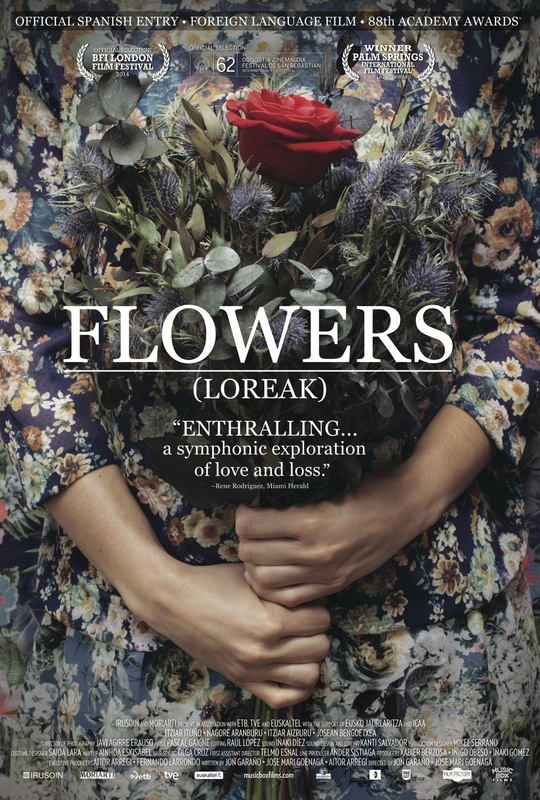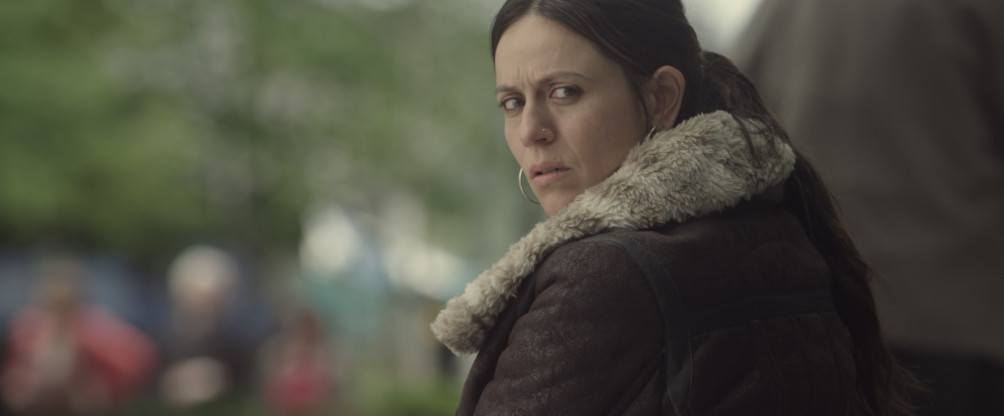
Reviewed by Jonathan Holland – Hollywood Reporter
The memorial flowers left on highway crash sites by the bereaved provoke in us a flash of quickly forgotten reflection as we speed by. With their second feature after 2010’s In 80 Days, Jose Mari Goenaga and Jon Garano have chosen instead to pull over and build a gently melancholic story around one such bunch of flowers. Despite the fears raised by its deceptively banal title, Flowers is an emotionally precise, subtle and quietly gripping exploration of the romance and remembrance that they evoke.
This is cinema for grown-ups, as quiet and unshowy as that title, and made for viewers with the life experience making them capable of recognizing its truths - but at the same time accessibly structured, like a thriller. At the very least Flowers, a film which absolutely deserves wider exposure, merits festival attention as one of the best Basque language films ever made.
Under the weather after hearing that she’s started the menopause early, and locked into an unfulfilled marriage with Ander (Egoitz Lasa), construction site office worker Ane (Nagore Aranburu) starts to receive flowers from, presumably, an unknown admirer. While Ander starts to feel jealous, Ane starts to feel better about herself, loses her bracelet, and unsuccessfully sets about uncovering the identity of the sender.
Meanwhile, toll booth attendant Lourdes (Itziar Ituno) is married to Benat (Josean Bengoetxea), a crane operator who spends his days working high above the construction site. Lourdes’ relationship with Bernat’s domineering mother Tere (Itziar Aizpuru) is tense, since she feels Lourdes is an unsuitable partner for her son. The viewer is just starting to wonder what these people are doing in Ane’s film when Benat crashes his car and is killed.
At one level it is here that the film really begins, the rest of it a compelling exploration of the emotional fallout of Benat’s crash. The unfortunate Benat, it turns out, will probably have a deeper impact on people’s lives from the morgue to which he’s sent than he ever did when he was alive. It is giving nothing away to say that Ane’s bracelet is found in his crane.
Flowers withering and dying is a millennia-long symbol of the ending of love, but Flowers is too clever for that, instead associating the flowers with the death not of love but of the memory of the loved one. Post Benat, Tere wishes to seek reconciliation with Lourdes, but she is rejected as the tight-jawed Lourdes seeks to close down her previous life. Should we seek to forget the tragedies that befall us, like Lourdes, or to remember them, as Tere does? In this, Flowers plays into Spanish social issues of historical memory and forgetting relating to Spain’s Francoist past, something which is briefly alluded to.
But happliy the focus remains tightly on the characters and on the capturing the subtle shifts in the relationships between them. The script, which itself feels like something carefully nurtured to maturity, is able to explore the emotional situations it posits right through to their final consequences: the conclusion, which comes via some emotionally supercharged, tremblingly tense dialogue between Ane and Lourdes, brings things elegantly full-circle.
Performances are up to the mark, with the boyish-faced Aranburu as the innocent, dreaming Ane, and Iranburu as the determined but damaged Lourdes, managing between them to explore a challengingly broad range of emotions (the men are very much in the background in Flowers). Javi Agirre Erauso’s photography often uses subdued tones to successfully evoke the atmosphere of airless non-communication in which these characters live. Pascal Gaigne’s score subtle string score is sparingly employed, in line with the film’s minimalism.
A DISCUSSION FOLLOWS EVERY FILM!
$6.00 Members / $10.00 Non-Members
The memorial flowers left on highway crash sites by the bereaved provoke in us a flash of quickly forgotten reflection as we speed by. With their second feature after 2010’s In 80 Days, Jose Mari Goenaga and Jon Garano have chosen instead to pull over and build a gently melancholic story around one such bunch of flowers. Despite the fears raised by its deceptively banal title, Flowers is an emotionally precise, subtle and quietly gripping exploration of the romance and remembrance that they evoke.
This is cinema for grown-ups, as quiet and unshowy as that title, and made for viewers with the life experience making them capable of recognizing its truths - but at the same time accessibly structured, like a thriller. At the very least Flowers, a film which absolutely deserves wider exposure, merits festival attention as one of the best Basque language films ever made.
Under the weather after hearing that she’s started the menopause early, and locked into an unfulfilled marriage with Ander (Egoitz Lasa), construction site office worker Ane (Nagore Aranburu) starts to receive flowers from, presumably, an unknown admirer. While Ander starts to feel jealous, Ane starts to feel better about herself, loses her bracelet, and unsuccessfully sets about uncovering the identity of the sender.
Meanwhile, toll booth attendant Lourdes (Itziar Ituno) is married to Benat (Josean Bengoetxea), a crane operator who spends his days working high above the construction site. Lourdes’ relationship with Bernat’s domineering mother Tere (Itziar Aizpuru) is tense, since she feels Lourdes is an unsuitable partner for her son. The viewer is just starting to wonder what these people are doing in Ane’s film when Benat crashes his car and is killed.
At one level it is here that the film really begins, the rest of it a compelling exploration of the emotional fallout of Benat’s crash. The unfortunate Benat, it turns out, will probably have a deeper impact on people’s lives from the morgue to which he’s sent than he ever did when he was alive. It is giving nothing away to say that Ane’s bracelet is found in his crane.
Flowers withering and dying is a millennia-long symbol of the ending of love, but Flowers is too clever for that, instead associating the flowers with the death not of love but of the memory of the loved one. Post Benat, Tere wishes to seek reconciliation with Lourdes, but she is rejected as the tight-jawed Lourdes seeks to close down her previous life. Should we seek to forget the tragedies that befall us, like Lourdes, or to remember them, as Tere does? In this, Flowers plays into Spanish social issues of historical memory and forgetting relating to Spain’s Francoist past, something which is briefly alluded to.
But happliy the focus remains tightly on the characters and on the capturing the subtle shifts in the relationships between them. The script, which itself feels like something carefully nurtured to maturity, is able to explore the emotional situations it posits right through to their final consequences: the conclusion, which comes via some emotionally supercharged, tremblingly tense dialogue between Ane and Lourdes, brings things elegantly full-circle.
Performances are up to the mark, with the boyish-faced Aranburu as the innocent, dreaming Ane, and Iranburu as the determined but damaged Lourdes, managing between them to explore a challengingly broad range of emotions (the men are very much in the background in Flowers). Javi Agirre Erauso’s photography often uses subdued tones to successfully evoke the atmosphere of airless non-communication in which these characters live. Pascal Gaigne’s score subtle string score is sparingly employed, in line with the film’s minimalism.
A DISCUSSION FOLLOWS EVERY FILM!
$6.00 Members / $10.00 Non-Members







